Pep Guardiola is the son of a bricklayer who has been described as the Che Guevara of football – but who exactly is the Manchester City manager?
As he comes towards the end of his second season in England the 47-year-old remains something of an enigma in the country in which he now lives.
I have been following his life and career for more than 20 years, talking during that period to him and the key people who have helped shape the person he has become.
Working on an update of my Guardiola biography Another Way Of Winning, I caught up with them to discover whether he remains the same – or whether England has changed him.
Old-fashioned values and Italian loafers
Guardiola was born 70km from Barcelona in the sleepy town of Santpedor, which lies in the shadow of the rocky outline of Monserrat, a giant, iconic, serrated mountain so precious to Catalans.
He was the third of four children born to Valenti Guardiola, a bricklayer, and Dolors Sala and raised in a working-class home with solid family principles and a clear sense of dignity.
The writer and film director David Trueba, who knows him better than many, says of his friend: “Nobody has paid any attention to the fundamental fact that Guardiola is a bricklayer’s son.
“For Pep, his father is an example of integrity and hard work. The family he has grown up with in Santpedor has instilled old values in him, values from a time in which parents didn’t have money or property to hand down to their children.
“When it comes to analysing or judging Guardiola, you must bear in mind that underneath the elegant suit, the cashmere jumper and the tie, is the son of a bricklayer. Inside those expensive Italian shoes there is a heart in espadrilles.”
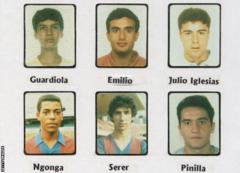
And no understanding of Guardiola is complete without a grasp of La Masia, until 2011 the home and production line of the Barcelona Academy set up by Johan Cruyff. For about six years from 1984 it was the home of Guardiola.
“I had the best years of my life at La Masia – a time focused on the single, most non-negotiable dream that I have ever had: to play for Barca’s first team.”
Barcelona and Netherlands legend Cruyff became Guardiola’s great mentor, a man he would meet regularly before and after becoming a manager.
Once a year, generally when the season was over, they would enjoy a long lunch at the famous El Bulli restaurant on the Costa Brava. It was an excuse to chat, drink wine, eat well and have afternoon sea baths.
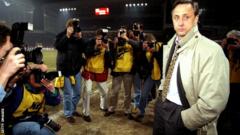
Can you imagine? Cruyff and Guardiola, two of world football’s great innovators, enjoying the creative genius of El Bulli owner Ferran Adria, a great culinary inventor and gastronomic inspiration to so many of the world’s great chefs.
The principles are the same. It is not just about being the best at playing the game or cooking the best meal, but more about changing the way the game is played and how the food is served and perceived – while having fun in the process.
Innovation, genius and talent combined with total dedication and unstinting toil and effort comes in many forms, be they sporting or culinary.
In a way, where else would the likes of Cruyff and Guardiola celebrate the end of a campaign?
However, Cruyff is by no means the only influence. Another is Argentine Marcelo Bielsa, the man known affectionately as ‘El Loco’ – the madman.
The former Chile and Argentina boss – most recently the head coach of Lille at club level – is a man of huge influence but relatively few trophies.
“It is important for me to say this about Marcelo because it doesn’t matter how many titles he had in his career,” Guardiola has said.
“We are judged by that – how much success we have, how many titles we have won. But his titles are much less important than how he has influenced football and his football players. That is why, for me, he is the best coach in the world.”
Bielsa told Guardiola during an 11-hour chat at the Argentine’s villa that football is all about an idea, fighting for it, improving players, and never losing the passion.
“Occasionally when I’m asked to do a talk in La Masia, I use the following example,” Guardiola once said.
“Each night when you are going to sleep, ask yourselves if, right then, you’d get up, grab the ball and play for a bit. If ever the answer is ‘no’ then that is the day to start looking for something else to do.”
| Guardiola – a life in football |
|---|
| Born in Santpedor, Catalonia in 1971, he joined Barcelona at the age of 13. |
| Barca boss Johan Cruyff saw him playing in a youth team game on the right of midfield and told the youth team coach to play him as a defensive midfielder – a position he made his own. |
| Guardiola made his full Barca debut in 1990, remained at the club until 2001 and was part of the ‘dream team’ that won the European Cup in 1992. |
| Guardiola went on to play for Brescia, Roma, Al-Ahli and Dorados before retiring in 2006. |
| He also made 47 appearances for Spain, scoring five goals. |
| Guardiola has managed Barcelona B, Barcelona, Bayern Munich and now Manchester City. |
His body is there, but the mind is miles away
If life teaches us anything it is that those who are the very best at what they do are invariably the ones that work the hardest. Pep is no exception.
Eidur Gudjohnsen once told me the story of going to see Guardiola to ask what he wanted from him if he was to stand a chance of getting more playing time at Barcelona. “Your life,” said Pep.
Guardiola’s assistant at City – and long-time friend – Manuel Estiarte laughed as he told me on many occasions he will be talking to Pep in the knowledge he is simply not listening, immersed instead in analysis of one thing or another.
“His body is there but his mind is miles away,” his friend admits.
They spend lots of time together, along with City’s director of football Txiki Begiristain, and when they relax with a bit of wine, Guardiola is a great storyteller. He laughs at himself and the world of football, but it is not always possible to take him away from it.
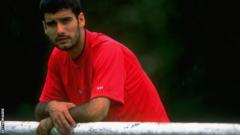
Guardiola is a sponge, keen to learn from anyone from England rugby union coach Eddie Jones to chess grandmaster Garry Kasparov. Perhaps on some level he is making up for his lack of structured education.
The principles he learned, ones he has evolved and improved over time, remain strictly non-negotiable. He might add to them by listening to others, but they are strict.
It goes like this.
What makes a team a unit, what makes this sport fun, is the ball.
Players became players to play with a ball, so let them have it as much as possible. And let’s build around the idea of having it all the time. But the ball burns you. Give it to a colleague as soon as you can. Play quick, play simple. And when you lose it – get it back as soon as you can, because it should hurt not to have it.
If you mix into this belief his obsessive desire to find solutions to problems (not exclusive to him as Cruyff, Bielsa, Mauricio Pochettino and Sir Alex Ferguson are made from the same mould), you find a coach that has developed a new way of winning; not the best way, just a different one.
Former Argentina manager and World Cup winner Cesar Luis Menotti, who earlier this year shared conversation and wine chosen by connoisseur Pep, admits Guardiola has changed football.
“Pep is the Che Guevara of football. I always said a revolutionary wins or dies in the fight and Pep’s idea remains unwavering,” said Menotti.
“He’s never going to change it: he wants to play well, he wants to own the space and he wants command of the ball. And he wants to handle the time, to stay ahead of the curve.”
His obsession with football can lead to feelings of guilt and remorse with those people closest to him, mostly his family.
I remember his dread when he missed out on a concert his daughter was playing in at school because he had forgotten about it and was watching DVDs of matches involving Barcelona’s next opponents, Getafe.
Having a sabbatical after Barcelona was a way to compensate for the time he had been away from them. But three months after saying goodbye to the Camp Nou he started conversations with Bayern.
In the early years of his coaching career he would prepare for any game in the same way, no matter the opponent. Three days before it, he spent hours watching videos of the rival, identifying weaknesses.
Then he would show clips to the players followed by a training session solely about the match.
It is here you will find Guardiola’s real magic. Once he has spotted a weakness in an opponent’s armour he can explain to his players how to exploit it.
Speaking about the 2011 Champions League final at Wembley – when Barca beat Manchester United 3-1 – Javier Mascherano told me: “While he was talking it wasn’t as if he was referring to a game that we were about to take part in, it was as if we were actually playing it right there.
“He was up and down, side to side in front of the board, gesticulating – and if you shut your eyes you were out there in the middle of the action.
“Everything that he said would happen, happened as he said it would. During the match I was thinking, ‘I’ve seen this already, I’ve already heard all about it – because Pep has already told me about it’.”
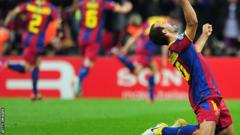
A man who needs to be liked?
Like most people, Guardiola is a man who would like to be popular. The difference is that unlike many he will not compromise his principles for popularity.
He cannot afford to do so if he wants to get to where he wants to get to – but perhaps it was not always like that. In the past he could not handle a bad look from a player, from say Samuel Eto’o or Thierry Henry, but now he understands it is part and parcel of the job.
He will tell you one of his biggest challenges is to ensure his players love him and believe in him.
He would like to be able to explain to a player why they have been left out – but knows they will never understand.
“I was a footballer, I know why they feel that way,” Pep admits. So part of the job now is to find a bench full of good people because it helps to make, he says, “a team of champions”.
To do so, Guardiola reckons it is important to make his players realise the privileged life they lead as footballers.
“He showed us a video that was really emotional,” said Pablo Zabaleta, who played for him at City last season. “I nearly cried. Some of the players were crying.
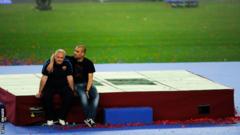
“There were some people from Barcelona who were working with immigrants, rescuing people from the streets. And he brought the physios and everyone in and said ‘I want you all to see how lucky you are to be doing what you are doing. We have the best building, the best training ground, we stay at the best hotels’.”
He was very closely and emotionally linked to his players at Barca and said he had to leave because they were going to “hurt each other” as there were difficult decisions to make.
At Bayern the cultural clash helped maintain some distance with some of the German footballers (even though he got very close to Philipp Lahm and Joshua Kimmich) and at City he has become an older brother or father figure to a very young squad.
Last season he took his large family, wives and girlfriends included, to a popular Spanish restaurant in town.
When David Silva had a son born prematurely earlier this season the rule was clear. “David, you tell me when you have to go to Spain and we will adapt.”
With Joe Hart there was never anything personal, just the style of a goalkeeper who could not adapt to the new City plan.
Samir Nasri and Yaya Toure were in such poor shape physically when he arrived that he expected them to improve before being made part of the group. When you are asked to win, there is no space for passengers – even if later on you decide to change your mind, as happened briefly with Yaya Toure.
A man with a truly Catalan soul
Pep is a product of Santpedor, a village that has kept a close link to Catalan culture, its history and identity.
He is therefore a proud Catalan, with fundamental core values and an inherent sense of justice instilled in him by his family and his environment from the very start. You can add to this an acute sense of the importance of symbology.
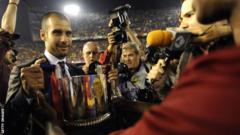
When a 21-year-old Guardiola stood on the balcony of the Placa Sant Jaume in Barcelona at the home of the Catalan Parliament in 1992 and raised the European Cup with the words “Ciutadans de Catalunya, ja la tenim aqui” (Citizens of Catalonia, at last we have her here) he was paraphrasing former Catalan leader Josep Tarradellas.
Tarradellas had been exiled in France since 1939 but returned on 23 October 1977 – two years after Spanish dictator General Franco’s death – and from the same place that Guardiola would later lift the trophy he proclaimed: “Ciutadans de Catalunya, ja soc aqui!” (Catalan for “Citizens of Catalonia, I am here at last!”).
Guardiola has always felt comfortable being the spokesman of a team.
While he is a firm believer in Catalonia’s right to independence from Spain, that is a long way from saying he is an extremist, or a politician in the making.
His much-discussed wearing of a yellow ribbon is not a call for independence but rather a protest against the imprisonment of democratically elected politicians by the Spanish government.
“Before a manager, I am a human being,” he said. “There are four guys in prison. There are other guys, who are outside of Catalonia; when they come back, they are going to be jailed, imprisoned for rebellion and sedition. It’s not about politicians, it’s about democracy.”
When he left Barcelona in 2012, a rumour abounded in the city. “He will come back as a president,” it was said.
He now says what was originally going to be a short coaching career could extend to his late fifties. And after that? If you write every chapter in advance, there is no mystery in the journey. So, he would tell you, who knows?
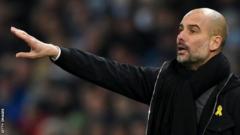
The door that’s always open – how Pep has transformed City
To fully understand why and how he has transformed City we need to look at how he has changed things wherever he has been.
When he took over at Barcelona he explained his ideology and how he wanted to play. Shortly afterwards, goalkeeper Victor Valdes came to see him. According to Valdes, this is how the conversation went:
Valdes: “Can I talk to you boss?”
Guardiola: “My door is always open…”
Valdes: “I need to ask one thing; all that you are talking about is fine, but only if the centre-backs want the ball.”
Guardiola: “I will make sure they want the ball.”
That was it. End of conversation. By his own admission, when his new young coach arrived, Valdes had zero tactical knowledge. Four years later, by the time he left, he could have taken a PhD in the subject.
In its simplest form Pep, who inherited a City side that had finished with the same points as United, has changed the club by identifying what was missing and what was surplus to requirements, then making the necessary changes.
Then it was a matter of train. And train. And train.
And convince them all they could win more and enjoy more with his methods and ideas.
There is more of course. Mark Hughes and Mark Bowen were invited to Pep’s room after the 7-2 defeat of Stoke in October and they asked him about his time at City. How is the second season different to the first? And how do you keep motivating them to keep winning week in week out?
“It’s easy when your two best players work harder and run further than anyone else in your team,” he said. He was referring to De Bruyne and David Silva. “What excuse does any other player have, if those two were doing that?”
Through his career he has transformed players who thought they had made it, who probably thought they had nothing new to learn.
Shortly after Pep’s appointment as head coach at Barcelona, Xavi had been considering his position at the club. Eager to find out where he stood, he went to see the new manager.
Xavi: “I won’t beat around the bush, Pep. I have one question for you; do you count on me?”
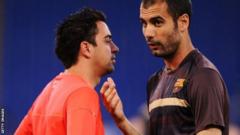
Pep: “I don’t see this team without you in it. I just don’t see this working without you.”
With that, Pep had reignited Xavi’s spark. The whole conversation had lasted less than 20 seconds.
While at Bayern he converted Lahm, one of the best full-backs in the world, into a great midfielder. Pep later called him “one of the most fantastic players I ever trained in my life and one of the most intelligent”.
Lahm went on to captain Germany to victory in the 2014 World Cup, often playing in the centre of the park.
Now at City he has transformed De Bruyne, with whom he has long conversations about football and life. But mostly football.
De Bruyne is one of those players who gets everything with very little explanation. Clearly, he had been doing his homework and knew Guardiola was going to challenge him to come out of his comfort zone.
After the first few conversations, and once he had confirmed his quality in training, Guardiola devised the idea of giving him a more central role.
De Bruyne could almost be considered the first signing of Guardiola’s era because Begiristain knew such a player would fit perfectly in a Pep team. And Pep fully agreed.
Raheem Sterling has been transformed from being a figure of fun into practically a near-certain starter for his country. Defender Nicolas Otamendi was ridiculed by many but has gone on to become one of the most effective defenders in the Premier League.
Most importantly, Ederson apart, the regular starting line-up is filled not with players Pep has bought but with those there when he arrived and who he has improved.
In fact most of the players that have significantly marked his tenure wherever he has coached (Sergio Busquets, Xavi, Messi, Lahm, Arjen Robben, De Bruyne, Silva, Otamendi, Sterling) were already at their clubs when he arrived. That, ultimately, is his greatest achievement.
So the question is, has Pep adapted to the Premier League or has the squad adapted to him? Hughes asked Pep what he felt the main difference between the Premier League and the Bundesliga was, and he smiled.
“Not one team in England ever lays down and dies. No matter the score, they keep on trying right to the end,” he said.
But the game is, like everywhere else, 11 versus 11 and the dimension of the pitches are basically the same.
So he has learnt all about his players. He has found out who is good for his style and who is not. Then he has applied to them his principles, which do not change because otherwise, as he says, “what is the point of doing something you don’t feel inside”.
So, more than the Catalan coach adapting to the Premier League, what we have been watching is a squad that has adapted to him.
More relaxed and flexible – why Pep might stay at City
For Guardiola to enjoy his job he needs to find it a personal challenge, he needs a club that really wants him and people who trust in what he does and believes. It is all interlinked and it is all at City.
That is why I think he will renew his current contract, which is scheduled to expire at the end of next season. He thinks there is still much to be done – and won.
He is happy in a city he knows well, going to music concerts and regularly visiting restaurants with his coaching staff or family – his wife Cristina and his children Valentina, Marius and Maria, who live with him in the city centre.
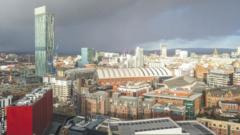
Indeed he is working, alongside Begiristain and City chief executive Ferran Soriano, towards opening a new restaurant with well-known Catalan chef, Paco Perez.
He has found a good balance in the way he approaches things.
He used to be absolute in his view on certain issues, but has become more flexible.
He does not watch three matches of his side’s next opponent any more, which at the time he thought vital to avoid anything escaping him. Now he watches selected pieces of action in half-hour sessions. And so he arrives at the games fresher.
He still hates it when the opposition have the ball, but depending on the players he has, he can mould the method of attacking when possession is regained.
In fact, since he left Barcelona, where he thought the team had to attack together and mostly in one particular way, he has learnt different ways of hurting rivals with the ball.
| A cabinet full of silverware |
|---|
| Guardiola enjoyed a glittering playing career with Barcelona that saw him win six La Liga titles and the Copa del Rey twice. |
| He also won the European Cup and the European Cup Winners’ Cup |
| As Barca boss Guardiola won 14 trophies in four seasons – La Liga (3), Copa del Rey (2), Spanish Super Cup (3), Champions League (2), Super Cup (2), Club World Cup (2) |
| Won a further seven trophies in three seasons at Bayern before leaving for Man City in 2016. |
| After a trophy-less first season in England, he won the EFL Cup this season and has now won the Premier League. |
He recently told me he understood why Arsene Wenger talks about having sleepless nights, chewing over decisions and details. He has had them sometimes at City, especially in his first season. It perhaps explains some of his most controversial reactions.
In his first campaign some of the bluntness of his answers to journalists came from a frustration at the lack of consistency of referees, the insistence from the media and certain quarters that he should change and look for a Plan B, and the implication he had to adapt much more to a new environment.
But halfway through that initial year he and his coaching staff decided that what they cannot influence, they had better ignore, which helped calm things down.
His assistants at City are a tightly knit group who firmly believe in Guardiola’s work and are determined to protect him – a wall surrounds them and hardly anything comes out.
He prefers not to give individual interviews but chooses his moments to explain himself.
The Spaniard enjoys travelling to Argentina – “they sell very well what they do and think – and I buy it all!” He has given lectures to audiences of thousands there about his methodology.
He recently made an appearance on Directv Sport, the TV channel that has the rights to broadcast the World Cup in Argentina, promoting their coverage.
After club football he would love to manage a national side, and some in Argentina are already trying to convince him to do so. Brazil was mentioned as a possibility before 2014.
But that will be later. Right now this intriguing and complex man is determined to keep teaching the philosophy he so fervently believes in – and winning trophies in the process.
Source:BBC
 News, Politics , Sports, Business, Entertainment, World,Lifestyle, Technology , Tourism, Gh Songs | News, Politics , Sports, Business, Entertainment, World,Lifestyle, Technology , Tourism, Gh Songs |
News, Politics , Sports, Business, Entertainment, World,Lifestyle, Technology , Tourism, Gh Songs | News, Politics , Sports, Business, Entertainment, World,Lifestyle, Technology , Tourism, Gh Songs |







